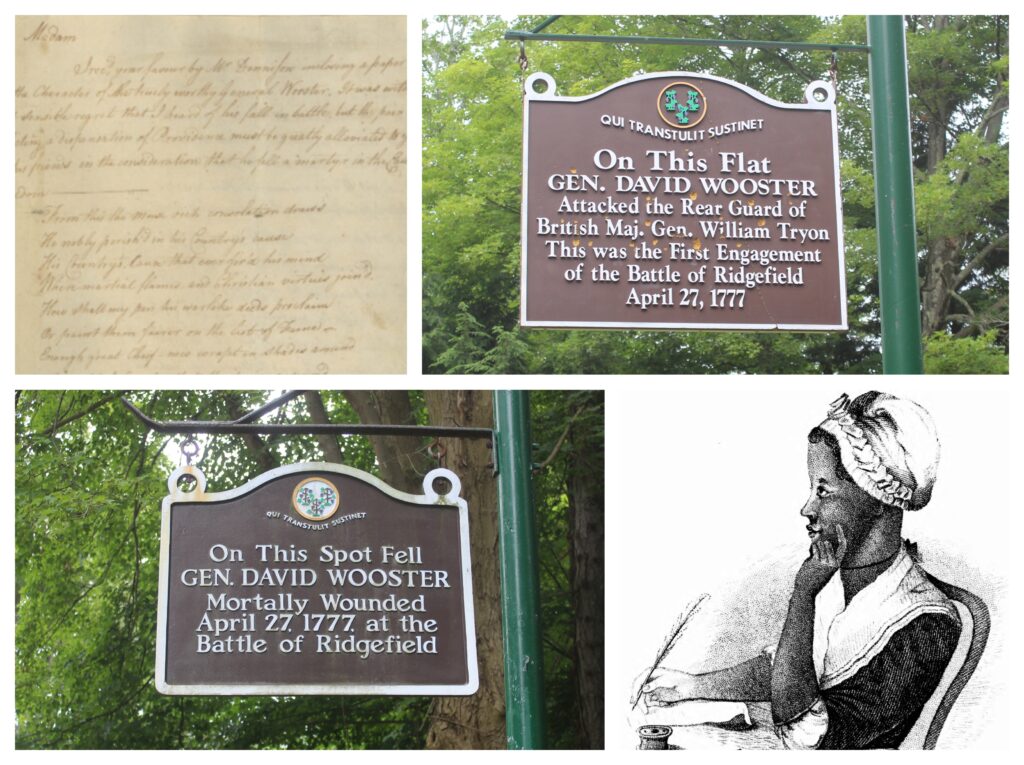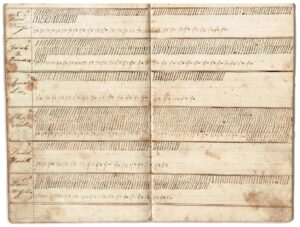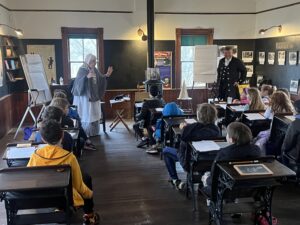When reading the historic plaques on Route 116 in Ridgefield, it’s easy enough to relegate General David Wooster to that day, April 27, 1777, and to focus on the dramatic events that surrounded him at the Battle of Ridgefield. But General Wooster, of course, was more than that day. He was a husband, a father, an intellect and, to many, a hero, with a long career fighting ardently for the independence of his country.
One item recently added to the Ridgefield Historical Society collection brings this to light. It’s a scan of a letter written by poet Phillis Wheatley to Mary Wooster after the death of her husband, and it includes an elegy on General Wooster’s death. Phillis Wheatley was a well-known and well-regarded poet, and the poem reflects her talents and the depth of her respect for Gen. Wooster. What made Wheatley particularly extraordinary at the time was her origins.
Phillis Wheatley was taken from West Africa as a young girl and sold as a slave to the Wheatley family of Boston in 1761. She was named for the boat she arrived on, The Phillis. The Wheatleys recognized her abilities early and taught her to read and write. Phillis became a well-known published poet by the age of 21 and was granted her freedom in 1774.
The original letter from Phillis Wheatley to Mary Wooster resides at the Massachusetts Historical Society. Given Gen. Wooster’s immutable connection to Ridgefield, a scan of this letter is also housed at the Ridgefield Historical Society. To view the scan of this letter, visit the Ridgefield Historical Society on Tuesdays – Thursdays, 1 – 5pm. Or view the letter online here.
The letter transcribes as follows:
A Letter from Phillis Wheatley to Mary Wooster, July 15 1778
Madam
I recd, your favour by Mr. Dennison inclosing a paper contain
ing the Character of the truely worthy General Wooster. It was with the
most sensible regret that I heard of his fall in battle, but the pain of so
afflicting a dispensation of Providence must be greatly alleviated to you and
all his friends in the consideration that he fell a martyr in the Cause of
Freedom —
From this the muse rich consolation draws
He nobly perish’d in his Country’s cause
His Country’s Cause that ever fir’d his mind
Where martial flames, and Christian virtues join’d.
How shall my pen his warlike deeds proclaim
Or paint them fairer on the list of Fame —
Enough, great Chief — now wrapt in shades around
Thy grateful Country shall thy praise resound —
Tho’ not with mortals’ empty praise elate
That vainest vapour to th’ immortal State
[Inly?] serene the expiring hero lies
And thus (while heav’nward roll his swimming eyes)
Permit, great power while yet my fleeting breath
And Spirits wander to the verge of Death —
Permit me yet to point fair freedom’s charms
For her the Continent shines bright in arms
By thy high will, celestial prize she came —
For her we combat on the feild of fame
Without her presence vice maintains full sway
And social love and virtue wing their way
O still propitious be thy guardian care
And lead Columbia thro’ the toils of war.
With thine own hand conduct them and defend
And bring the dreadful contest to an end —
For ever grateful let them live to thee
And keep them ever Virtuous, brave, and free —
But how, presumptuous shall we hope to find
Divine acceptance with th’ Almighty mind —
While yet (O deed ungenerous!) they disgrace
And hold in bondage Afric’s blameless race;
Let virtue reign — And those accord our prayers
Be victory our’s, and generous freedom theirs.
The hero pray’d — the wond’ring spirit fled
And sought the unknown regions of the dead —
Tis thine fair partner of his life, to find
His virtuous path and follow close behind —
A little moment steals him from thy sight
He waits thy coming to the realms of light
Freed from his labours in the ethereal skies
Where in succession endless pleasures rise! —
You will do me a great favour by returning to me by the first oppy
those books that remain unsold and remitting the money for those that
are sold — I can easily dispose of them here for 12/Lmo. each —
I am greatly obliged to you for the care you show me, and your
condescention in taking so much pains for my Interest — I am
extremely sorry not to have been honour’d with a personal acquaintance
with you — if the foregoing lines meet with your acceptance
and approbation I shall think them highly honour’d.
I hope you will pardon the length of my letter, when the rea-
son is apparent — fondness of the subject & — the highest
respect for the deceas’d — I sincerely sympathize with you in
the great loss you and your family sustain and am sincerely
Your friend & very humble sert
Phillis Wheatley.
Learn more about Phillis Wheatley
Learn more about General David Wooster








